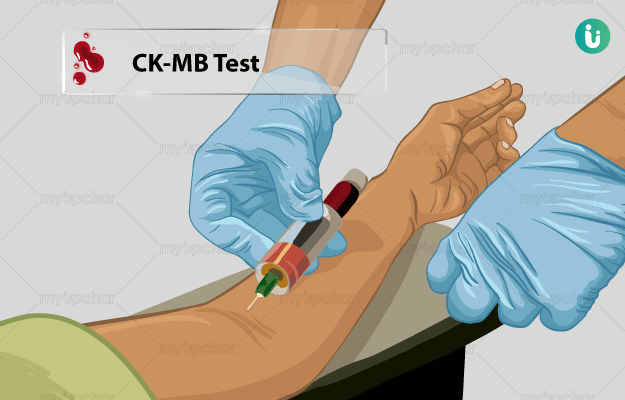


Creatine kinase also referred to as creatine phosphokinase (CPK), is an enzyme found predominantly in the heart and skeletal muscles and in small quantities in the brain. During an injury, stress or muscle damage, it is secreted into the bloodstream.
A CK-MB test is usually suggested to diagnose acute myocardial infarction or a heart attack. CK-MB exists in two forms. CK-MB 2 is released by cardiac cells and is converted to CK-MB 1 in blood. A prompt assay, within 6 hours of the onset of cardiac symptoms, helps in the correct diagnosis of myocardial infarction.
Test results can be confirmed by clinical diagnosis and evaluation of other cardiac biomarkers.

CK-MB, an isoenzyme of creatine kinase, is an important cardiac marker. Its elevated levels can be detected in the blood serum in cases of heart injury, heart attack and other heart-related conditions. Strenuous exercise can also release the enzyme into the bloodstream. Sometimes, a ratio of CK-MB1: CK-MB2 is determined in myocardial infarction. It is advisable to perform the test in case of the following signs and symptoms as they are suggestive of a cardiac problem and need immediate attention:
Although the abovementioned symptoms may be indicative of heart attack, a CK-MB confirmatory test is required immediately to begin the correct treatment.
myUpchar doctors after many years of research have created myUpchar Ayurveda Hridyas Capsule by using 100% original and pure herbs of Ayurveda. This Ayurvedic medicine has been recommended by our doctors to lakhs of people for problems like high blood pressure and high cholesterol, with good results.




















No special preparation is required for this test. Your doctor would inform you about the test and mention a possible repetition of the test. No fasting is required prior to the test, and it can be carried out at any hour; however, you will not be allowed to take any intramuscular injection 1 hour before the test. Make sure that you inform your doctor about any current medications that you are taking or had done any recent physical activity as they may have an effect on the levels of the enzyme.
CK-MB test is simple and noninvasive. A technician will collect about seven millilitres (mL) of your blood by inserting a needle in your forearm by venepuncture; the sample tube will be then capped properly and sent for analysis. Some patients experience slight pain at the site of injection.
Levels of CK-MB rise in the serum within 4-6 hours of myocardial infarction and reach a peak in 16-30 hours; however, they also disappear faster than they appear in the bloodstream. Hence, the test needs to be repeated after 48 hours.
Normal results: Normal levels of CK-MB isoenzyme in the serum are less than 3%. Normal values indicate an absence of heart damage or any cardiac involvement. Laboratories that also check the ratio of CK-MB1: CK-MB2 consider less than 1.5 international units (IU)/litre (L) as the normal value.
Different labs usually have different reference values due to methods and equipment used.
Abnormal results: Elevated levels above 3% serum concentration of CK-MB are considered abnormal. CK-MB level determination is a 98% positive predictor for myocardial necrosis. Higher than normal values of CK-MB suggest the following:
It is necessary to conduct the test within 24 hours of the appearance of cardiac symptoms. Early testing may yield false-negative results. Occasionally, CK-MB is elevated, but there are no cardiac symptoms; clinical evaluation is important in such cases. This can happen in case of athletes during or after competitions. Recent surgery, insertion of a catheter, prolonged exercise and some medications may also result in elevated levels of CK-MB.
Although troponin is widely used nowadays as a cardiac biomarker, CK-MB test is still significant and provides a correct diagnosis.
Disclaimer: All results must be clinically correlated with the patient’s complaints to make a complete and accurate diagnosis. The above information is provided from a purely educational point of view and is in no way a substitute for medical advice by a qualified doctor.
